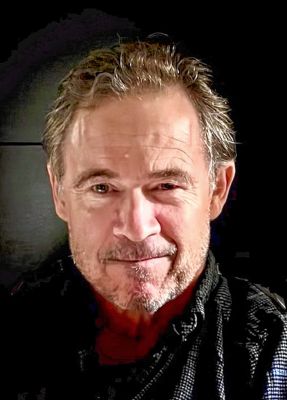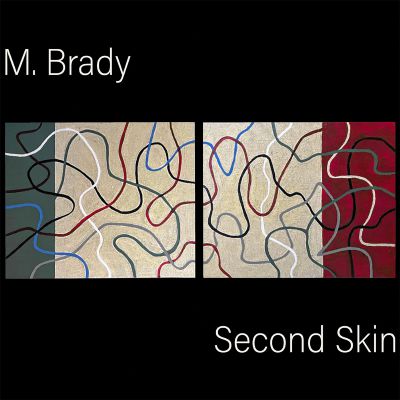
By Jennifer Levesque
For the Valley Advocate
Michael Brady is a psychotherapist and songwriter based out of the Berkshires. His debut release, “Second Skin,” is a concept album written about fictional case studies Brady has concocted from inspirations from his profession. “It’s been a long, but ultimately transformational process,” he said about creating it.
The album cover for “Second Skin” reminded me of my late Aunt Ethel’s kitchen table top. Then a memory sprung into my mind … the boomerang-looking shapes of the formica table I sat at when I was a kid eating tuna fish sandwiches and sipping on a can of ginger ale. I was always presented with Reese’s Peanut Butter Cups once I completed my lunch. Then my mind went further and I wondered if such a simple image like that was intentional? Was it meant to draw out the listener’s projections, like an inkblot test? Possibly.
The album is a mixture of soft, delicate sounds with emotional lyrics. It’s beautiful, and yet sometimes sounds the way depression feels; Like they say, there is no light without the dark.
Jennifer Levesque: Can you tell the readers a little about yourself and your musical past?
Michael Brady: I’m a full time psychotherapist in private practice in the Berkshires and a part time songwriter and musician. I’ve been passionate about music ever since hearing the song “Stairway to Heaven” as a teenager. This led me to the guitar, but I didn’t play seriously or begin writing songs in earnest until my 40s. My brother was and is a great musician/songwriter and now an advertising guru. I was the tennis pro and shrink in the family. It took me a long time to crawl out of my identity in the family and the self imposed shadow of comparison that I placed on myself.
Levesque: What are some of your musical influences?
Brady: So many, but the most influential were Bruce Cockburn, Leonard Cohen, Bon Iver, Ani DiFranco, Radiohead, Califone, Talk Talk, Joni Mitchell, Gillian Welch and The National. You get the idea, any music that creates an emotional mood either musically or lyrically. I would be remiss to not include my mother as an influence. She was a liturgical singer who was really a torch song singer in disguise. And while I’m not a torch singer, she was my first influence as a very young person; listening to her emotional and haunting voice undoubtedly influenced my singing style.
Levesque: You said that this album has helped you face some of your own fears that resulted in you walking away from music 20 years ago. What was the initial spark that gave you the idea to start this album?
Brady: For many years I wrestled with doubt, felt like my songs were too intimate and vulnerable, etc. All of this contributed to me being unwilling to share them with others. This went on for many years despite being confident and willing to be vulnerable in every other aspect of my life. The initial spark to overcome these fears and make the record occurred because I began to feel an overwhelming cognitive dissonance that I was encouraging my clients to take risks and be vulnerable, but I wasn’t taking on the skeletons in my own musical closet. That became intolerable and I decided to not only make the record, but also commit to full-on vulnerability by appearing on podcasts and other media that pushed me out of my comfort zone.
Levesque: I, along with so many others, have dealt with mental health issues. So I understand that talking with others, or hearing stories about issues that are similar to yours helps you feel okay with what you’re feeling, and reminds you that you are not alone. Was that a feeling you had when writing this album, as if you were writing it with your patients and others you pulled inspiration from? Is the name of the album a nod to that?
Brady: Great questions. The power of music and lyrics can penetrate us emotionally in ways that our cognitive minds can not. Brain science proves this is true. I’m often hesitant to share a lot of the details about the meaning of songs because I recognize how powerful projecting our own experience onto a song can be. That process can often expand insight about ourselves and be a force of healing. I have hoped that the record might be helpful to others in that same vein. One of the reasons I am actively publicizing my experience of overcoming doubt and imposter fantasy is because I thought it would be helpful to share my story with others who are struggling in the ways I have.

CONTRIBUTED
“I began to feel an overwhelming cognitive dissonance that I was encouraging my clients to take risks and be vulnerable, but I wasn’t taking on the skeletons in my own musical closet,” said Michael Brady. “That became intolerable and I decided to not only make the record, but also commit to full-on vulnerability by appearing on podcasts and other media that pushed me out of my comfort zone.”
And yes, the title of the album “Second Skin” and the song itself are nods to shedding the skin of fear and evolving into a bigger version of ourselves.
Levesque: Are there any tracks on the album that were harder than others to write because of the heavy subjects? If so, can you share the process you have?
Brady: Yes, definitely some subject matter is harder than others. I didn’t want the record to be a saccharine kumbaya experience that didn’t acknowledge some of the challenging parts of therapy. One of the toughest topics is mortality. I have walked with multiple clients from their initial terminal diagnosis to their passing. The song “No Doubt” was probably the hardest to write because I was reminded of several clients who have passed. That being said, I like to think that this song, like many of the others, sets up an internal problem of some kind and then attempts to document how clients wrestle with the issue to get to a greater peace or an opening of some kind.
In terms of my process, writing songs from the first person perspective of my fictional clients has transformed the way I write. I feel like an actor entering into the persona of a character they are portraying, which has helped me create more intimate, honest songs than I have in the past.
Levesque: Did you have a feeling of catharsis once you finalized this album?
Brady: Most definitely. The experience of making the record was one of the most transformational and rewarding things I’ve ever done. I was forced to confront, challenge and rewire some old fears and distorted beliefs that felt hardwired into my emotional DNA. I’m really proud of the record.
Levesque: Do you have any plans to play any shows in support of this album or any other releases in the near future you want to share?
Brady: I wish I could say I’m supporting the record with live shows, but playing live is next up on my list of musical and vulnerability challenges. I’ve attempted to play live on several occasions only to have anxiety transform my baritone into sounding like a thin, squeaky thing; quite amazing how anxiety can temporarily paralyze the vocal cords. But, that was many years ago and I do feel like I’ve created an alternate persona in these past few years that is capable of negotiating the anxiety as I was able to do as a tennis player. I have been writing lyrics in a much more committed way than I ever have and there are a bunch of songs lined up that I intend to record for my second album. I’m excited to see what evolves next.
You can check out “Second Skin” along with more info about Michael Brady at http://mbradymusic.com/.









